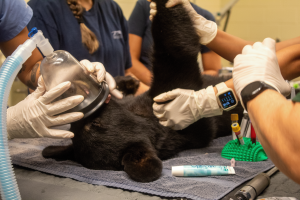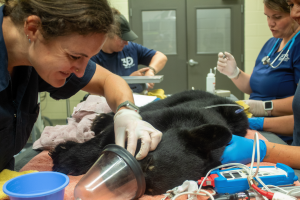

Our veterinary and animal care team examines Leia during her intake exam.
Editor’s Note: The Florida Fish and Wildlife Conservation Commission’s (FWC) Bear Management Program works closely with Brevard Zoo and other partners to ensure orphaned black bear cubs not yet able to survive on their own are given the best chances at successful rehabilitation and eventual release back into their natural habitat. FWC Bear Management biologists are scheduling releases of rehabilitated bear cubs born this year to be done in January 2026, which is outside of Florida’s black bear hunting season set for December 2025. Additionally, rehabilitated bear cubs will be released into habitat that is not part of current established bear hunting zones. The FWC aims to release rehabilitated young bears on public conservation areas that have high quality bear habitat and low density of both bears and people to give them the best chances for survival.
The force is strong with these cubs! Luke and Leia, a pair of Florida black bear siblings, are the newest additions to our Black Bear Rehabilitation Center, affectionately known as Brody Bear’s Rescue and Rehab.
There are now 12 cubs scurrying about the Center, while Jon Bear remains in our L3Harris Animal Care Center as he heals.
For those of you who may be new to our blog, the purpose of our Rehabilitation Center is to rescue, rehabilitate and release Florida black bear patients from across the state, giving them the second chance they deserve.
We are one of the main facilities in Florida that acts as a resource for young, orphaned bears in the state who are often found with health issues. Without rescue and rehabilitation, these cubs would likely not survive in their native habitat.
Returning these cubs to their native range is important to our ecosystem’s balance. As foragers, bears disperse seeds as they forage for food like fruit and berries. This supports a diverse population of plants – helping other native animals as well.
At our Rehabilitation Center, our expert veterinarians and knowledgeable bear care team preps these cubs with everything they need to thrive in their natural range once again and play this important role.

Luke during his intake exam.
Seven-month-old Luke and Leia were found together in the Florida Panhandle, without a mother to show them the ropes of how to mature as a bear cub. Fortunately, our initial exams showed the cubs are in good health and just need proper nutrition, socialization and care (this is where we come in).

The cubs both have similar blonde eyebrow markings.
You may be wondering how we have the space for all these cubs, but that’s exactly what our Rehabilitation Center was designed for. With three nighthouses and a 3,500-square-foot yard full of climbing structures, platforms and pools, our patients are well-equipped with resources to live their best lives.
The sibling cubs now happily spend their days alongside the rest of our cub crew, Rickie, Morty, Frosty, Fern, Branch, Berry, Larry, Mo, Curly and Blaze. Check back with our blog and social media accounts for more updates on all our cubs, their growth and their antics!
Special thanks to our generous supporters of our Black Bear Rehabilitation Center, including Pat McMahon and Bob Mansbart, as well as the Fleming Family Foundation.
We would like to thank the following generous donors for supporting our mission-based programs:
Flammio Financial Group · Stifel- Garvin Wealth Management Group · Artemis IT · Pepsi Bottling Company · Amazon · PCL Construction | Nassal | MEC | Heard
Contact FWC’s Wildlife Alert Hotline at 888-404-FWCC (3922) if you have found a sick, orphaned, injured or dead Florida black bear. You can also leave feedback for FWC commissioners regarding FWC’s Bear Management Plan here.